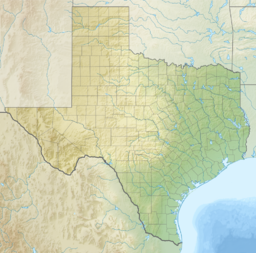| Lavaca Bay | |
|---|---|
 Lavaca Bay toward Point Comfort | |
| Location | Texas Gulf Coast |
| Coordinates | 28°37′29″N 96°35′05″W / 28.624761°N 96.584759°W |
| River sources | Lavaca River, Garcitas Creek |
| Ocean/sea sources | Gulf of Mexico |
| Basin countries | United States |
| Settlements | Port Lavaca, Point Comfort |
Lavaca Bay (/ləvˈɑːkə/ ) is a northwestern extension of the Matagorda Bay system found mostly in Calhoun County, Texas, United States. The ports of Port Lavaca and Point Comfort have been established on the bay, and are the main areas of human habitation. Linnville was located on the bay until its abandonment after the Great Raid of 1840, and the major port of Indianola was found near the confluence with the main Matagorda Bay, until the town's final destruction following the massive hurricane of 1886.[1] Smaller communities include Olivia, Alamo Beach and Magnolia Beach. Lavaca Bay is approximately 82 miles (130 km) northeast of Corpus Christi, about 121 miles (190 km) southwest of Houston, and 145 miles (230 km) southeast of San Antonio.
In the late 1680s, French explorer René-Robert Cavelier, Sieur de La Salle built a colony dubbed Fort St. Louis in this area. A June 1996 dig at the site that was believed to be the correct location revealed eight French cannon. This led archeologists to excavate the Keeran Ranch site in the area, during 1996–2002; they concluded that the Spanish Presidio La Bahía fort "was built on the La Salle settlement". Some 10 percent of the artifacts recovered are believed to have originated in France.[2]
The bay is noted for its superfund site, caused by mercury pollution from the heavy industry in Point Comfort (specifically Alcoa), across the bay from the largest settlement of Port Lavaca. Although fishing has declined in recent years due to fears of contamination, the bay supports a large finfish population, and the efforts of environmental organizations and the federal government have pressured Alcoa to reduce the polluted areas.
- ^ Cite error: The named reference
handbookwas invoked but never defined (see the help page). - ^ "La Salle's Texas Settlement". Texas State Historical Association. Retrieved March 30, 2021.
